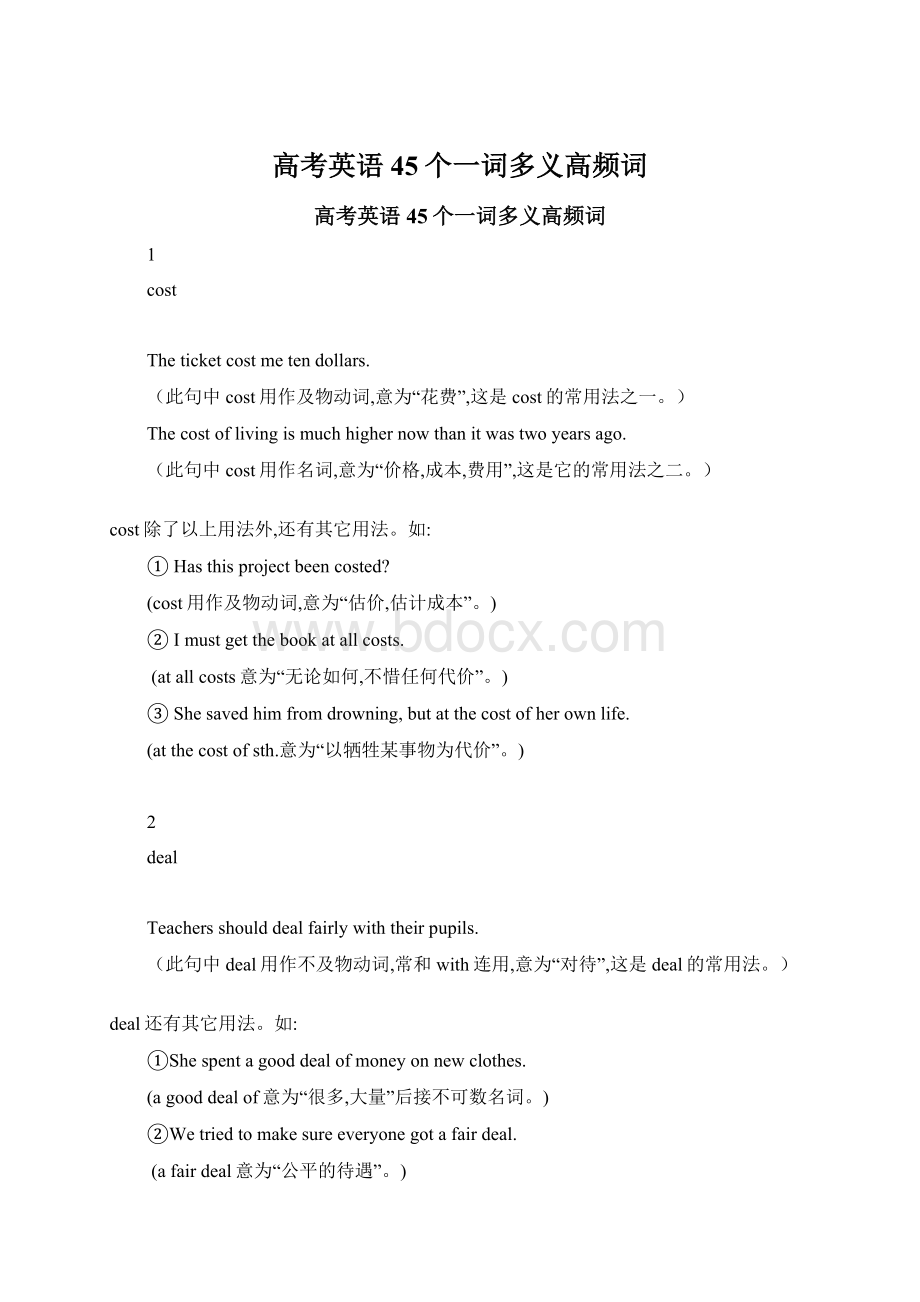高考英语45个一词多义高频词.docx
《高考英语45个一词多义高频词.docx》由会员分享,可在线阅读,更多相关《高考英语45个一词多义高频词.docx(21页珍藏版)》请在冰豆网上搜索。

高考英语45个一词多义高频词
高考英语45个一词多义高频词
1
cost
Theticketcostmetendollars.
(此句中cost用作及物动词,意为“花费”,这是cost的常用法之一。
)
Thecostoflivingismuchhighernowthanitwastwoyearsago.
(此句中cost用作名词,意为“价格,成本,费用”,这是它的常用法之二。
)
cost除了以上用法外,还有其它用法。
如:
①Hasthisprojectbeencosted?
(cost用作及物动词,意为“估价,估计成本”。
)
②Imustgetthebookatallcosts.
(atallcosts意为“无论如何,不惜任何代价”。
)
③Shesavedhimfromdrowning,butatthecostofherownlife.
(atthecostofsth.意为“以牺牲某事物为代价”。
)
2
deal
Teachersshoulddealfairlywiththeirpupils.
(此句中deal用作不及物动词,常和with连用,意为“对待”,这是deal的常用法。
)
deal还有其它用法。
如:
①Shespentagooddealofmoneyonnewclothes.
(agooddealof意为“很多,大量”后接不可数名词。
)
②Wetriedtomakesureeveryonegotafairdeal.
(afairdeal意为“公平的待遇”。
)
③Mybankdealsinstocksandsharesnow.
(dealin意为“经营”。
)
④Theteacherdealtoutthetestpaperstothestudents.
(dealout意为“分发”。
)
3
interest
interest在教材中的意思为“兴趣”和“使感兴趣”,分别作名词和动词用。
ThemoneyIborrowedfromhimwasrepaidwithinterest.
Whathedidwasjusttoprotecthisowninterests.
上面句子中的两个interest都作名词用。
作“利息”讲时,为不可数名词;作“利益,好处”讲时,多用复数形式。
第一句可译为“我向他借的那笔钱是带息偿还的。
”;第二句可译为“他所做的一切仅仅是为了保护他自己的利益。
”
4
drive
Canyoudriveacar?
(drive用作动词,意思为“开车,驾驶”,是教材中的第一种用法。
)
Let’sgoforadriveinthecountry.
(drive用作名词,意思为“驱车旅行”,是教材中的第二种用法。
)
除了以上用法外,drive还有其它用法。
如:
①Theworkerscarriedonadriveforgreaterefficiencylastmonth.
(drive用作名词,意思为“运动”。
)
②Therearethreebusesparkedonthedrive.
(drive用作名词,意思为“车道”。
)
③Povertydrovethelittleboytosteal.
(drive用作动词,意思为“驱使”。
)
④I’msurethatI’vedrivenmyopinionhome.
(drivesth.home意思为“把……讲透彻,使充分理解”。
)
⑤Pleasedrivethedogaway.
(drivesb./sth.away意思为“把……赶跑”。
)
5
joinv.&n.
Whatclubdoyouwanttojoin?
(此句中的join是及物动词,意为“加入,参加”,这是其最常见的用法。
)
另外它还有其它用法。
如:
①Thetworiversjoinatthebridge.
(此句中的join是不及物动词,意为“会合,联合,相遇”。
)
②Thetwopieceswerestucktogethersowellthatwecouldhardlyseethejoin.
(此句中的join是名词,意为“连接处,接缝”。
)
6
dream
dream在教材中有两种用法:
用作动词时意思为“做梦,梦到”;用作名词时意思为“梦想,幻想”。
dream除了以上用法外,还有以下几种用法。
如:
Hernewdressisanabsolutedream.
(dream用作名词,意思为“美丽或美好的人或事物”。
)
Myaunt’sweddingceremonywentlikeadream.
(golikeadream是固定短语,意思为“非常顺利,完美”。
)
7
know
I’veknownDavidfor20years.
Ihopewehavetaughtourchildrentoknowrightfromwrong.
Theoldmanhasknownbothpovertyandwealth.
know在教材中的意思为“知道,了解”,作动词用。
在上面的三个句子中,know都作动词用,第一个know的意思为“认识”;第二个know的意思为“区分”;第三个know的意思为“亲身经历”。
8
fail
Ifyoudon’tworkhard,youmayfail.
(此句中fail意为“失败;不及格,没有通过考试”。
)
fail还有其它用法。
如:
①Heneverfailstowritetohismothereveryweek.
(fail意为“忘记、忽视或未能做某事”。
)
②Shehasbeenfailinginhealth.
(failin意为“(健康状况)衰退”。
)
③Hisfriendsfailedhimwhenhemostneededthem.
(fail意为“使失望,辜负”。
)
④Ihadthreepassesandonefail.
(fail用作名词,意为“考试不及格”。
)
⑤I’llbethereattwoo’clockwithoutfail.
(withoutfail意为“肯定,一定,必定”。
)
9
lead
lead在教材中有两种用法:
用作动词时意思为“引导,领导”;用作名词意为“领先;领先地位;带头”
除了教材中的用法外,lead还有以下几种用法。
如:
Whichroadleadstothemountain?
(lead用作动词,意思为“通向,通往”。
)
Mygrandmotherisleadingaquietlifeinthecountryside.
(lead用作动词,意思为“过某种生活”。
)
Nothavingabalanceddietcanleadtohealthproblems.
(lead用作动词,意思为“导致”。
)
Herbrothertooktheleadinthehighjump.
(lead用作名词,意思为“领先地位”。
)
Inthisnewfilm,sheisthelead.
(lead用作名词,意思为“主角”。
)
10
fall
Theleavesfallinautumn.
(此句中fall用作动词,意为“落下,下降”,这是其常用法。
)
fall还有其它用法。
如:
①Ihadafallandbrokemyarm.
(fall用作名词,意为“跌落,掉下,降落”。
)
②Ourholidayplansfellthroughbecauseofbadweather.
(fallthrough意为“落空,未能实现,成为泡影”。
)
③Mycarisfallingapart.
(fallapart意为“破裂,破碎,散架”。
)
④Wefellabout(laughing)whenweheardthejoke.
(fallabout意为“无法控制地大笑”。
)
⑤Sam,pleasefallbackonoldfriendsintimeofneed.
(fallbackon意为“求助于,退到”。
)
11
low
Thesunislowinthesky.
(此句中low用作形容词,意为“低的,矮的”,这是low的常用法。
)
low还有其它用法。
如:
①She’sbeenfeelingratherlowsinceherillness.
(low用作形容词,意为“消沉的”。
)
②Thesimplestwaytosucceedinbusinessistobuylowandsellhigh.
(low用作副词,意为“低价地,廉价地”。
)
③Thegasisrunninglow.
(runlow意为“几乎耗尽”。
)
12
blind
Sheisblindinthelefteye.
(此句中blind用作形容词,意为“瞎的,盲人的”,这是blind的常用法。
)
blind还有其它用法。
如:
①Theblindsweredrawntoprotectthenewfurniturefromthesun.
(blind用作名词,意为“窗帘,遮光物”。
)
②Thesoldierwasblindedintheexplosion.
(blind用作动词,意为“使失明”。
)
③Thisisablindletter.
(blindletter意为“因地址写得不清而无法投寄的信件”。
)
④Heturnedablindeyetohermistakes.
(turnablindeyeto意为“对……熟视无睹”。
)
⑤He’sblindasabatwithouthisglasses.
(blindasabat意为“完全看不见东西的”。
)
13
film
大家都很熟悉film作名词时有“电影”的意思。
除此之外film还有其它的意思。
如:
①Iputanewrolloffilminmycamera.
(film在此句中作名词,意思为“胶卷,胶片”。
)
②IttookthemnearlyayeartofilmthisTVseries.
(film在此句中作动词,意思为“拍摄”。
)
14
land
Thepilotlandedtheplanesafelyintheheavysnow.
(此句中的land用作及物动词,意为“使着陆”,这是land的常用法之一。
)
Thejourneytothefarsideoftheislandisquickerbylandthanbysea.
(此句中的land用作名词,意为“陆地,大地”,这是land的常用法之二。
)
除了以上用法外,land还有其它用法。
如:
①Manyfarmersareleavingthelandtoworkinindustry.
(theland意为“农村,农业”。
)
②Thecarwilllandyouthereintwentyminutes.
(land用作动词,意为“使到达,把……送到某地”。
)
③He’sreallylandedhimselfinitthistime.
(landsb./oneselfinsth.意为“使某人陷入困境”。
)
④Hewantstoseehowthelandliesbeforetakinganyaction.
(howthelandlies意为“事态,形势,概况”。
)
15
cause
She’salwayscausingtrouble.
(此句中cause用作及物动词,意为“使发生,引起”,这是cause的常用法。
)
cause还有其它用法。
如:
①Smokingisoneofthecausesofheartdisease.
(cause用作可数名词,意为“原因,理由”。
)
②Peoplefoughtforthecauseoffreedomandpeace.
(cause用作名词,意为“事业,目标”。
)
16
full
Thetheaterisfull,I’mafraidyou’llhavetowaitforthenextshow.
(此句中full用作形容词,意为“满的,充满的”,这是full的常用法。
)
full还有其它用法。
如:
①Jackhithimfullintheface.
(full用作副词,意为“直接地,精确地”。
)
②Useyourabilitiestothefull.
(tothefull意为“充分地,彻底地”。
)
③Hetoldmethestoryinfull.
(infull意为“全部地,全文地”。
)
17
clean
Wemustkeepourhandsclean.
(此句中的clean用作形容词,意为“干净的,清洁的”,这是clean的常用法之一。
)
Sheiscleaningtheblackboard.
(此句中的clean用作动词,意为“弄干净,清洁”,这是clean的常用法之二。
)
除了以上用法外,clean还有其它用法。
如:
①Icleanforgotaboutit.
(clean用作副词,意为“彻底地,完全地,全部地”。
)
②Thecarneedsagoodclean.
(clean用作名词,意为“清洁过程,清扫”。
)
③Thegovernmentshouldcomecleanaboutitsplans.
(comeclean意为“说出真相,全盘招供”。
)
④Wecleanthemachinedownattheendofeachday.
(cleansthdown意为“擦洗干净”。
)
⑤Thewaiterhurriedtocleanupthepiecesofthebrokenplates.
(cleanup意为“清理掉,收拾干净”。
)
18
hold
hold在教材中的意思为“举行;召集;主持”,作动词用。
Theplaneholdsabout200passengers.
Whoholdstheworldrecordforthehighjump?
(上面两个句子中的hold还是动词的用法,但意思发生了变化,分别为“容纳”和“保持”。
)
19
light
Thisisaroomwithgoodlight.
(light用作名词,意思为“光,光线”,是教材中的第一种用法。
)
ItissolightthatIcancarryiteasily.
(light用作形容词,意思为“轻的”,是教材中的第二种用法。
)
light除了以上的常见用法外,还有下列几种用法。
如:
①MayIborrowyourlight?
(light用作名词,意思为“火柴,打火机”。
)
②Sinceyou’renotwell,you’dbetterdosomelighthousework.
(light用作形容词,意思为“轻松的,使人不疲劳的”。
)
③Mybrotherboughtabottleoflightbeerintheshop.
(light用作形容词,意思为“低度酒的”。
)
④Waitamoment.I’lllightacandle.
(light用作动词,意思为“点燃”。
)
20
home
home在教材中的第一个意思为“家”,作名词和副词用;第二个意思为“家庭的”,作形容词用。
Alotofnewhomesarebeingbuiltinthecenterofthetown.
Thehometeamtooktheleadafter25minutes.
It’stimeforhomenews.
在上面的三个句子中,第一个home作名词用,意思为“住宅,房子”;其余的两个作形容词用,意思分别为“主场的”和“国内的”。
21
mean
mean在教材中的意思为“意思是,打算”,作动词用。
这是我们大家都熟悉的意思。
除此之外mean还有其它的意思。
如:
①Maryhasalwaysbeenmeanwithmoney.
(mean在此句中作形容词,意思为“吝啬的,小气的”。
)
②Todaythemeantemperatureis10℃inShanghai.
(mean在此句中作形容词,仅用于名词前,意思为“平均的”。
)
22
mind
Wouldyoumindhelpingme?
(此句中mind用作动词,意为“介意,注意”,这是mind的常用法之一。
)
Hehasamindforscience.
(此句中mind用作名词,意为“头脑,思维”,这是mind的常用法之二。
)
mind除了以上用法外,还有其它用法。
如:
①YoumustbeoutofyourmindifyouthinkI’mgoingtolendyou$50!
(beoutofone’smind意为“发狂,发疯,精神不正常”。
)
②Keepyourmindonthejob!
(keepone’smindonsth.意为“继续专心于某事物”。
)
③Herwayofspeakingputmeinmindofhermother.
(putsb.inmindofsb./sth.意为“使某人想到或想起某人/某事物”。
)
④—Who’sthatletterfrom?
—Neveryoumind.
(neveryoumind意为“不关你的事”。
)
23
miss
We’llmissyouverymuchifyoumove.
(此句中miss用作及物动词,意为“想念,怀念,思念”,这是miss的常用法。
)
miss还有其它用法。
如:
①Afterseveralmisseshefinallymanagedtohitthetarget.
(miss用作名词,意为“失误,失败,击不中,回避”。
)
②Theofferofayearaboardwithallexpensespaidseemedtoogoodtomiss.
(toogoodtomiss意为“很吸引人或很有利而无法拒绝或放弃”。
)
③Bobwillfindoutyoursecret—hedoesn’tmissatrick!
(notmissatrick意为“非常机警或警觉”。
)
24
minute
Theyonlytookfifteenminutestofinishthatjob.
(此句中minute用作名词,意为“分钟;片刻;一会儿”。
)
minute还有其它用法,如:
①Yoursuggestionwillbeminuted.
(minute用作动词,意为“将某事载入备忘录或会议记录”。
)
②Herclothesarealwaysrightuptotheminute.
(uptotheminute意为“最新的;时髦的”。
)
③Thedetectivestudiedthefingerprintsintheminutestdetail.
(minute用作形容词,读作/mai’nju:
t/,意为“极详细的;准确的”。
)
25
move
Shewastootiredtomoveanyfurther.
(此句中move用作动词,意为“移动;搬动;迁移;运行”。
)
move还有其它用法,如:
①Hesatinthecorner,watchingmyeverymove.
(move用作名词,意为“地点或位置的变动”。
)
②It’sgettingdark.We’dbettermakeamove.
(makeamove意为“出发;起程;动身”。
)
③Thepriceofeggsmovedaheadtoday.
(moveahead意为“有进展;上涨”。
)
26
rich
rich在教材中的意思为“富有的;富饶的”,作形容词用。
Doyoulikerichfood?
Hernewcoatisinrichred.
上面句子中的两个rich也作形容词用,但是意思分别为“油腻的”和“(颜色)浓艳的”。
第一句可译为“你喜欢吃油腻的食物吗?
”;第二句可译为“她的新大衣是艳红色。
”
27
present
present在教材中的意思为“礼物”和“现在,目前”,作名词用。
Therewere300peoplepresentattheweddingparty.
WepresentedourEnglishteacherwithbeautifulflowers.
ThecinemawillpresentPerhapsLoveonSaturday.
Youmustpresentyourselfwellataninterview.
上面句子中的四个present,第一个作形容词用,意思为“出席的,到场的”;其余的三个都作动词用,意思分别为“赠送”、“上演,演出”和“展示”。
第一句可译为“有三百人出席了婚礼”;第二句可译为“